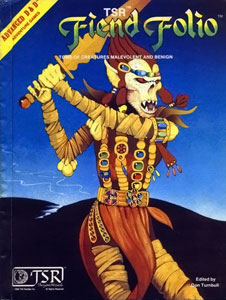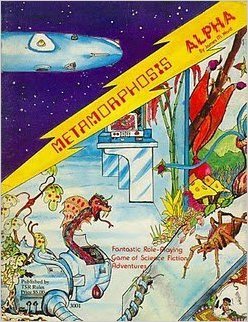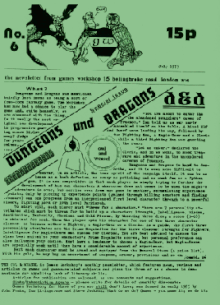
Ernest Gary Gygax was an American game designer and author best known for co-creating the pioneering tabletop role-playing game Dungeons & Dragons (D&D) with Dave Arneson.

White Dwarf is a magazine published by British games manufacturer Games Workshop, which has long served as a promotions and advertising platform for Games Workshop and Citadel Miniatures products.

Sir Ian Livingstone is an English fantasy author and entrepreneur. Along with Steve Jackson, he is the co-founder of a series of role-playing gamebooks, Fighting Fantasy, and the author of many books within that series. He co-founded Games Workshop in 1975 and helped create Eidos Interactive as executive chairman of Eidos Plc in 1995.

TSR, Inc. was an American game publishing company, best known as the original publisher of Dungeons & Dragons (D&D). Its earliest incarnation, Tactical Studies Rules, was founded in October 1973 by Gary Gygax and Don Kaye. Gygax had been unable to find a publisher for D&D, a new type of game he and Dave Arneson were co-developing, so he founded the new company with Kaye to self-publish their products. Needing financing to bring their new game to market, Gygax and Kaye brought in Brian Blume in December as an equal partner. Dungeons & Dragons is generally considered the first tabletop role-playing game (TTRPG), and established the genre. When Kaye died suddenly in 1975, the Tactical Studies Rules partnership restructured into TSR Hobbies, Inc. and accepted investment from Blume's father Melvin. With the popular D&D as its main product, TSR Hobbies became a major force in the games industry by the late 1970s. Melvin Blume eventually transferred his shares to his other son Kevin, making the two Blume brothers the largest shareholders in TSR Hobbies.

Games Workshop Group is a British manufacturer of miniature wargames, based in Nottingham, England. Its best-known products are Warhammer and Warhammer 40,000.

Fiend Folio is the name of three separate products published for successive editions of the fantasy role-playing game Dungeons & Dragons (D&D). All three are collections of monsters.
Steve Jackson is a British game designer, writer, game reviewer and co-founder of UK game publisher Games Workshop.
Battlecars is a simple wargame based upon the Mad Max genre of a post-apocalyptic world dominated by aggressive, warring gangs. It was first published by Games Workshop in 1983 and the game designers were Gary Chalk and Ian Livingstone.

Metamorphosis Alpha is one of the first science fiction role-playing games, published in 1976. It was created by James M. Ward and originally produced by TSR, the publisher of Dungeons & Dragons.

A man-to-man wargame is a wargame in which units generally represent single individuals or weapons systems, and are rated not only on weaponry but may also be rated on such facets as morale, perception, skill-at-arms, etc. The game is designed so that a knowledge of military tactics, especially at the small unit or squad level, will facilitate successful gameplay. Man-to-man wargames offer an extreme challenge to the designer, as fewer variables or characteristics inherent in the units being simulated are directly quantifiable. Modern commercial board wargaming stayed away from man-to-man subjects for many years, though once the initial attempts were made to address the subject, it has evolved into a popular topic among wargamers.

Robert J. Kuntz is a game designer and author of role-playing game publications. He is best known for his contributions to various Dungeons & Dragons-related materials.

Games Day is a yearly run gaming convention sponsored by Games Workshop. It was started in 1975, after another games convention scheduled for August that year cancelled. Games Workshop decided to fill the resulting gap by running a gaming day of their own. As a result, after some delays, the first Games Day was held at Seymour Hall, London on 20 December 1975. The convention was important because there were few outlets for gamers to meet each other and play, and Games Workshop used this in their efforts to build the gaming scene in the U.K.
Ian Marsh is a British writer, magazine editor, and entrepreneur.
Timothy James Kask is an American editor and writer in the role-playing game industry. Kask became interested in board games in his childhood, and later turned to miniatures wargames. While attending university after a stint in the US Navy, he was part of a group that playtested an early version of the new role-playing game Dungeons & Dragons (D&D) for game co-designer Gary Gygax. Gygax hired him as the first employee of TSR, Inc. in 1975. After editing some of TSR's early D&D publications, Kask became editor of The Strategic Review, which later became The Dragon, and then Dragon Magazine.
Brian John Blume was an American game designer and writer, principally known as a former business partner of Gary Gygax at TSR, Inc., original publishers of the fantasy role-playing game Dungeons & Dragons.
Theron O. Kuntz is a game designer who was an early associate of Gary Gygax and employee of TSR.
Don Turnbull was a journalist, editor, games designer, and an accomplished piano and pinball player. He was particularly instrumental in introducing Dungeons & Dragons into the UK, both as the managing director of TSR UK Ltd and as the editor of the Fiend Folio.
John Peake is a traditional board game maker and one of the founders of Games Workshop.

DragonLords, subtitled "Yet Another Fantasy & Sci-Fi Roleplaying Magazine", is a British role-playing game fanzine from the late 1970s and early 1980s. Self-published originally by Marc Gascoigne, Mike Lewis, and Ian Marsh, DragonLords produced 22 issues from c. 1978 to 1985.
Albion is a small press magazine focussed on the game of Diplomacy that was published from 1969 to 1975 by Don Turnbull.













